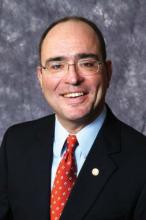Delegates didn’t go for it: "To go back on what the Congress of Delegates decided last year would be to make a divisive issue only more contentious. The testimony and research by the American College of Obstetricians and Gynecologists made it clear that marriage is a key to the access to health care. The adoption of the proposed resolution would say that the AAFP no longer believes that civil marriage is a health issue. In the final analysis ... the Congress of Delegates did not adopt the resolution to support civil [same-gender] marriage, but to serve the health of our members, our patients, and our communities," wrote the resolution committee, winning the day.
Medical marijuana came up, too.
New York asked delegates to fight state approval of smoked cannabis, arguing that it’s the business of the FDA to regulate drugs, not state legislators and that smoking pot probably hurts the lungs. AAFP’s N.Y. members are working stop the Empire State from approving medical marijuana, and wanted the academy’s help.
After testimony about marijuana’s benefits for sick people, delegates decided to sidestep the issue and vote instead for AAFP research and "expressing concerns" about the safety of smoking it.
The academy was also directed to take a few steps on women’s health issues.
Among them, it will try to stop the Centers for Medicare & Medicaid Services from requiring abnormal pap smears before paying for HPV screening. The American Society for Colposcopy and Cervical Pathology wants doctors to screen high-risk women over age 29 years for HPV during routine Pap smears, whatever their prior results. Delegates voted that payment guidelines need to match those of experts. Also, AAFP will also now support IUDs as first-line contraceptives for most women, and work to end prior approval for FDA-cleared contraceptive devices. The Affordable Care Act requires their coverage, so requiring prior authorization doesn’t make any sense, California and Texas delegates said in their resolutions.
The academy is going to look into pushing for OTC birth control pills, as well, but delegates didn’t want it to support OTC access without more investigation. Some worried that insurance companies won’t cover OTC birth control, and others that women might "stop visiting their family physicians if they no longer had to rely on them for birth control prescriptions."
Putting the ‘primary’ back into primary care education
Medical schools were the subject of three strong resolutions from New Hampshire delegates tired of hearing about professors who shoot down primary care as a career option.
Delegates didn’t like that either and voted for AAFP to poll new residents about what medical school faculty said regarding family care, and to figure out how many medical school graduates go into primary care each year and how many are still at it 5 years later.
The big hammer, though, was a vote from delegates for the academy to consider a push to link medical school accreditation and CMS education reimbursements to the number of graduates who go into primary care.
A better way for rural EDs
The AAFP endorsed Comprehensive Advanced Life Support (CALS) training as "an appropriate advanced life support course for" rural physicians and will consider it as an alternative to Advanced Trauma Life Support (ATLS) for low-level state trauma designation.
That’s not a trivial decision for rural emergency departments (EDs), where a lone family physician, physician assistant, or nurse practitioner is on the hook to handle anything that comes through the door, without help from specialists.
CALS was designed in Minnesota 20 years ago to help providers in rural EDs do that. "Other ED courses focus on specific emergencies. We compressed them, eliminated the redundancies, and added psychiatric, neurologic, burn, and other emergencies the other courses don’t cover," said Dr. Paul Van Gorp, a family practitioner in Long Prairie, Minn., and CALS board chair.
"It’s been very successful. We’ve presented CALS in nine states and several countries; people who have taken it, many from remote places like Alaska, have wonderful things to say about it, but not every state recognizes CALS as an acceptable route to qualify as a level 3 or 4 trauma center," he said.
In most states, "the only route to trauma level designation is ATLS, but trauma is just a small part of what we see," he said.
AAFP’s recognition will add heft to efforts to get states to recognize CALS as an alternative.
The course has 2 days of scenario-based training, a half-day trauma module that meets requirements for state trauma designation, and a day-long benchmark skills lab. A sheep is killed in the lab, but "we recognize that there’re a lot of people opposed to us using animals in this way, so we developed" an alternative that "entirely uses mannequins as a substitute," Dr. Van Gorp said.


